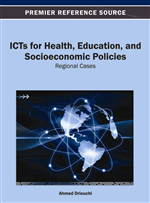 FEMISE vient de publier un nouveau volume dans sa série de «Volumes édités FEMISE »en anglais sous le titre : ICTs for Health, Education and Socioeconomic Policies : Regional Cases. Le Volume édité par le Dr. Ahmed Driouchi, Professeur d’Economie appliquée à l’Université d’ Akhawan et Doyen de l’Institut d’Analyse Economique et d’études prospectives. Le volume est publié par IGI Global et contient un certain nombre de recherches financées par FEMISE.
FEMISE vient de publier un nouveau volume dans sa série de «Volumes édités FEMISE »en anglais sous le titre : ICTs for Health, Education and Socioeconomic Policies : Regional Cases. Le Volume édité par le Dr. Ahmed Driouchi, Professeur d’Economie appliquée à l’Université d’ Akhawan et Doyen de l’Institut d’Analyse Economique et d’études prospectives. Le volume est publié par IGI Global et contient un certain nombre de recherches financées par FEMISE.
« ICTs for Health, Education and Socioeconomic Policies: Regional Cases », examine les avantages qui peuvent être obtenus par des interactions entre santé, éducation et domaines socio-économiques. Ce livre qui donne une orientation régionale sur la Méditerranée du Sud, le Moyen-Orient, et les économies arabes, est indispensable pour les chercheurs, universitaires, développeurs, décideurs et étudiants des cycles supérieurs qui s’intéressent à ces régions et études spécifiques.
Table des matières
Need of a Balance between Fragmented and Coordinated Decision-Making (pages 1-24)
Insights to the Interconnections of Health, Education, and Other Wealth Components (pages 25-47)
Theoretical Model and Foundations for Assessing Interactions of Health, Education, and Economic Outcomes (pages 48-70)
Descriptive Statistics, Regression Analysis, and Tests of Hypotheses of Interdependencies of Health, Education, and Economic Outcomes (pages 71-102)
ICTs and Socioeconomic Performance with Focus on ICTs and Health (pages 104-125)
ICTs, Youth, Education, Health, and Prospects of Further Coordination (pages 126-145)
Women Empowerment and ICTs in Developing Economies (pages 146-164)
ICTs and Coordination for Poverty Alleviation (pages 165-189)
The Triple Helix as a Model for Coordination with Potential for ICTs (pages 191-210)
Socioeconomic Reforms, Human Development, and the Millennium Development Goals with ICTs for Coordination (pages 211-229)
Social Deficits, Social Cohesion, and Prospects from ICTs (pages 230-251)
Risk Factors, Health, Education, and Poverty: Can ICTs Help1? (pages 252-277)
Implications of the Findings and Prospects for Further Coordination (pages 278-296)
Pour commander ce livre veuillez suivre ce lien


